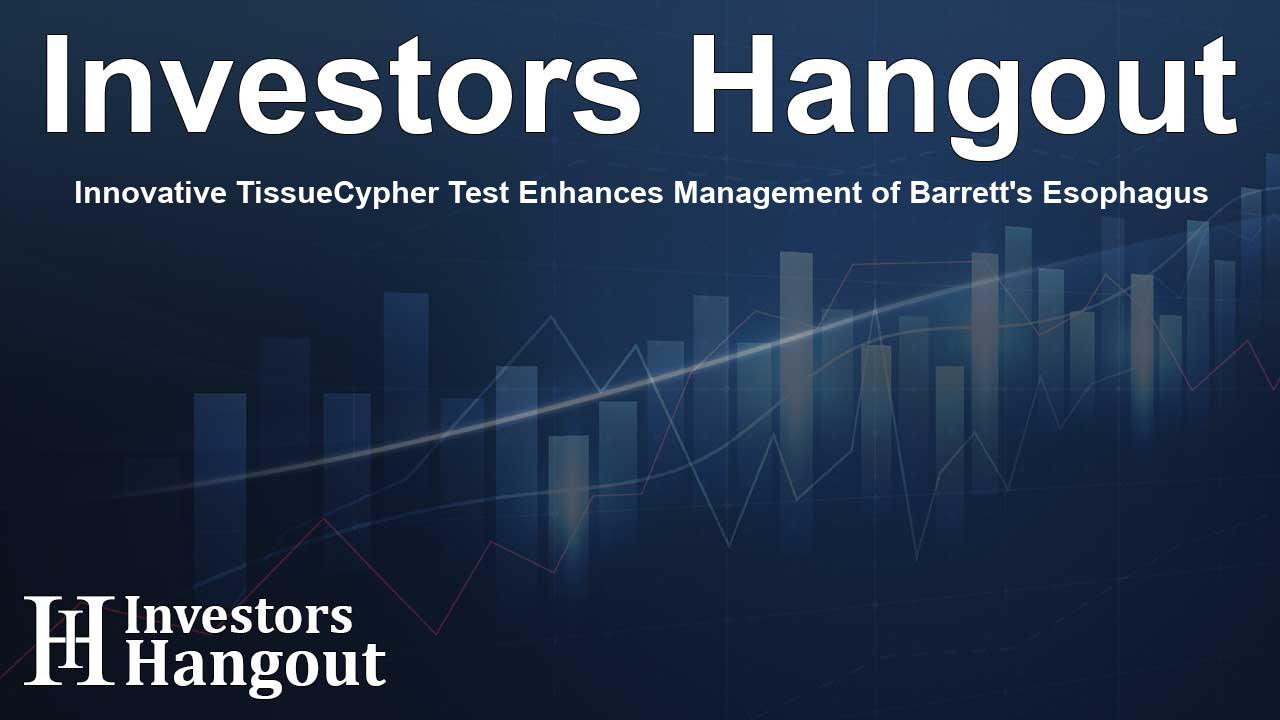Innovative TissueCypher Test Enhances Management of Barrett's Esophagus

Transforming Barrett's Esophagus Care with TissueCypher
Advancements in medical diagnostics are crucial for improving patient outcomes, and Castle Biosciences, Inc. (Nasdaq: CSTL) is at the forefront of this revolution. With their innovative TissueCypher Barrett’s Esophagus test, they aim to reshape how healthcare professionals approach patient care, particularly for patients diagnosed with Barrett's esophagus.
New Insights from Recent Research
Recent findings highlight the ability of TissueCypher to deliver actionable insights beyond standard pathology assessments. This groundbreaking research, presented at a notable gastroenterology meeting, emphasizes the test's role in identifying patients at a higher risk of developing esophageal cancer, ultimately facilitating timely interventions. Such precision can lead to the effective reduction of unnecessary medical procedures for patients categorized as low-risk.
The Relevance of Accurate Risk Assessment
Dr. Edward Horvath, a gastroenterologist associated with Gastro Health, elaborated on the difficulties in accurately determining progression risk based solely on pathology. He stated, "TissueCypher provides objective, individualized risk information, which supports personalized decisions around surveillance and intervention." By leveraging the results from this test, clinicians can take proactive steps to mitigate risks associated with Barrett's esophagus, potentially improving patient survival rates.
Recognition of Quality Research
The research presented during the American College of Gastroenterology Annual Scientific Meeting was met with great enthusiasm, especially the studies that earned the prestigious Presidential Poster Award. These findings, derived from rigorous examinations, underscore the test's reliability and potential to enhance patient management.
Critical Case Studies Presented
The research includes three pivotal case studies demonstrating the impact of TissueCypher:
- P0689: This study highlighted how pathologists often face ambiguity in cases where findings are classified as indefinite for dysplasia. TissueCypher identified two patients with significant risks of progression to high-grade dysplasia and esophageal adenocarcinoma.
- P4977: This case focused on patients with non-dysplastic Barrett’s esophagus and their unexpected progression risks. The results illustrated how early interventions were guided by the data provided by TissueCypher.
- P4930: A rural community study that tested patients with non-dysplastic Barrett's esophagus showcased how TissueCypher could stratify risk levels, influencing clinical decisions for 93% of the patients.
About the TissueCypher Barrett’s Esophagus Test
TissueCypher represents a significant advancement in precision medicine, specifically designed for predicting the future development of high-grade dysplasia and esophageal adenocarcinoma. This test is vital for patients diagnosed with Barrett's esophagus and has been validated through numerous peer-reviewed studies globally. The test aims to personalize the monitoring and treatment strategies for patients, fostering more effective and targeted interventions.
About Castle Biosciences
Castle Biosciences (Nasdaq: CSTL) continues to enhance healthcare through innovative diagnostic tests that guide patient care. Their commitment is to improve disease management and help clinicians make informed decisions by prioritizing patients first. With tests catering to multiple conditions including skin cancers and Barrett’s esophagus, Castle is at the leading edge of transforming medical diagnostics.
Frequently Asked Questions
What is the TissueCypher Barrett’s Esophagus test?
The TissueCypher Barrett’s Esophagus test is designed to predict the risk of developing high-grade dysplasia and esophageal cancer in patients diagnosed with Barrett's esophagus.
How does the TissueCypher test improve patient care?
By providing individualized risk assessments, the TissueCypher test helps doctors make informed decisions on monitoring and interventions, particularly for those at a higher risk of cancer progression.
What recent findings were presented about TissueCypher?
Recent studies presented at a gastroenterology meeting showcased TissueCypher's ability to identify patients at significant risk, supporting earlier interventions and reducing unnecessary procedures.
Who conducted the research on TissueCypher?
The research was conducted by a team of gastroenterologists and clinicians who presented their findings highlighting the effectiveness of the TissueCypher test.
How can I learn more about Castle Biosciences?
You can explore Castle Biosciences’ website for detailed information but they are actively engaged in enhancing diagnostic innovations across multiple disease areas.
About The Author
Contact Logan Wright privately here. Or send an email with ATTN: Logan Wright as the subject to contact@investorshangout.com.
About Investors Hangout
Investors Hangout is a leading online stock forum for financial discussion and learning, offering a wide range of free tools and resources. It draws in traders of all levels, who exchange market knowledge, investigate trading tactics, and keep an eye on industry developments in real time. Featuring financial articles, stock message boards, quotes, charts, company profiles, and live news updates. Through cooperative learning and a wealth of informational resources, it helps users from novices creating their first portfolios to experts honing their techniques. Join Investors Hangout today: https://investorshangout.com/
The content of this article is based on factual, publicly available information and does not represent legal, financial, or investment advice. Investors Hangout does not offer financial advice, and the author is not a licensed financial advisor. Consult a qualified advisor before making any financial or investment decisions based on this article. This article should not be considered advice to purchase, sell, or hold any securities or other investments. If any of the material provided here is inaccurate, please contact us for corrections.
